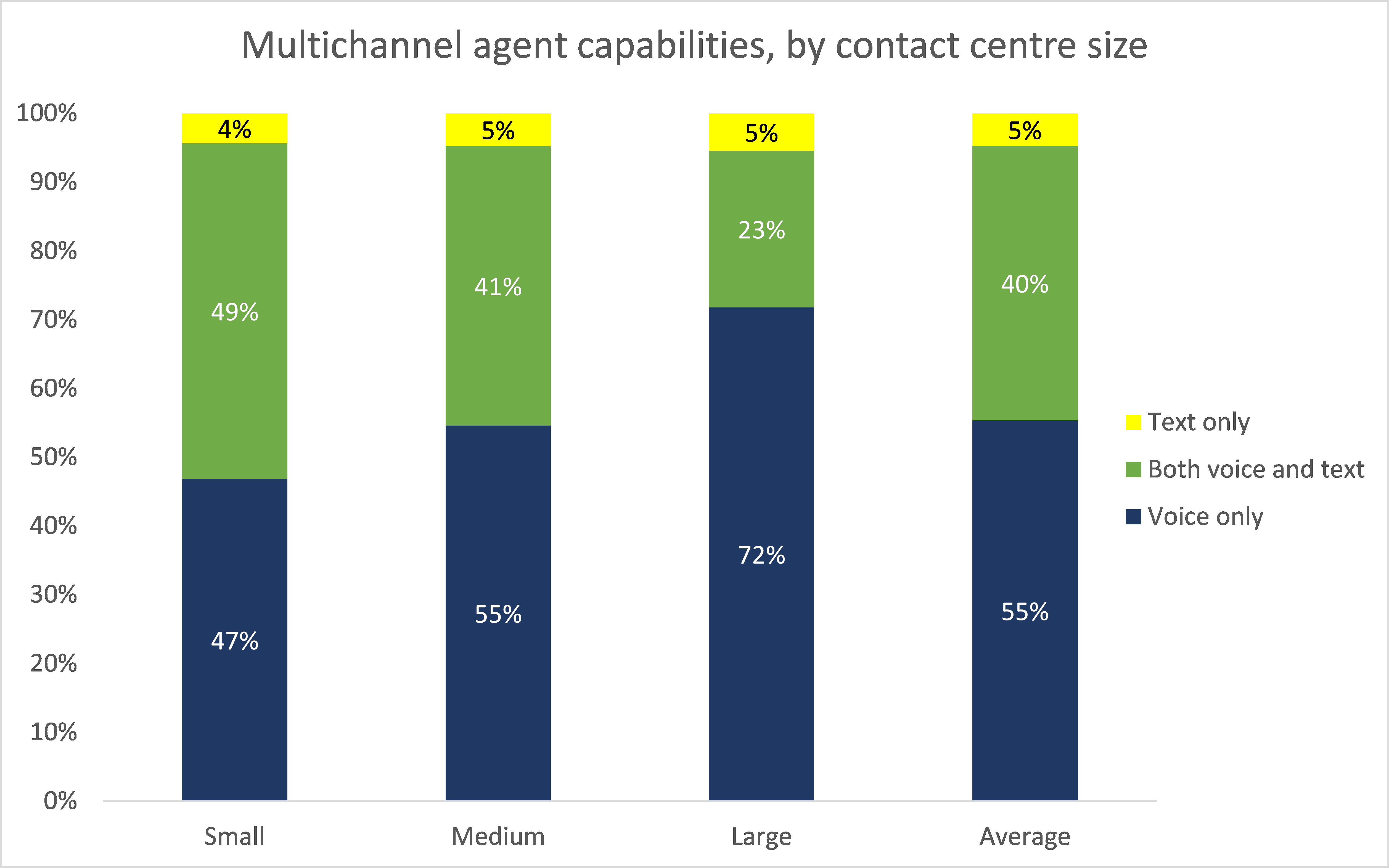Should call centre advisors be in charge of multiple channels? Or would it be of greater benefit for advisors to become specialised in just one?
Call Nature and Size Matters
So far, the decision of whether or not to skill advisors on multiple channels in your contact centre has probably been made with regard to its size.
According to Steve Morrell, Managing Partner at ContactBabel, this is because smaller contact centres “tend not to have the depth of resource available to operate dedicated single channel teams.”
This highlights that multi-skilled advisors are less valuable to large contact centres, as evident in the chart below, which focuses on voice/text blending.

However, the nature of calls and the flow of traffic coming into the contact centre should also be closely considered.
Amanda Bowbanks, who works at Jabra, agreed with this assertion and stated that: “If it’s a heavy call-centric contact centre then focusing on the core demand of inbound calls should be the main task.
“If the traffic comes from various channels then skilling and equipping the workforce to handle more than one line of enquiry is required – so they know which channel to prioritise and how to seamlessly switch between channels effectively to keep customers happy.”
So, if you are part of a small to medium sized contact centre, with a varied call-flow, it is important for you to consider the benefits that multichannel advisors will bring.
How Multichannel Advisors May Improve The Contact Centre
Advisor Engagement
Being tasked with only chats, emails or phone calls alone can be repetitive, uninspiring and wearisome, which can only negatively affect your company’s customer service.
Ensuring advisors are cross-skilled on a mix of channels and subjects combats this problem and helps to maintain motivation levels in the contact centre.
To do this, MOO, the highly successful online stationery provider, try to keep channel activities varied and limited to 2–3 hours per task.
Dan Moross, Director of Online Experience at MOO, says that: “We’ve adopted an agile approach where agents are assigned at least 2 different channels through the day, typically swapping at lunch time or after coffee breaks.
“In terms of mixing channels, chats and calls are most efficiently done independently, but email can be combined to fill gaps in chats and phone calls.”
Making a change like MOO’s to a system will help to breed a positive culture in the contact centre, as your staff will recognise as that you are making steps to improve their daily routine.
This improvement could consequently improve the working relationship between you and your advisors, increasing advisor engagement and productivity.
Improves Skills
Generally, staff in contact centres are very young in comparison to other professions, with the average advisor being under 30 years old. So it is important for you to help advisors learn new skills, offering an opportunity for personal development in the role.
By providing new responsibilities, you are also progressing your advisors’ skill sets, which consequently boosts their future job prospects.
This could cause an increase in enthusiasm, which is highly beneficial in terms of motivation, productivity and passion for the role.
In addition, by increasing responsibility, you are adding new skills to forthcoming job descriptions. This means that you may well be opening the job up to better qualified applicants in the future. Or you could offer “blended advisor” roles to experienced staff for career progression and recognition of value.
Lowers Attrition
Advisor attrition remains a big issue in the contact centre industry, with 2015 reports showing an average rate of 22%.
When discussing moving advisors between voice and text operations, Steve Morrell remarked that: “this approach, whether ad hoc or through a more formal blended approach, has been proven many times in past years’ data to be positively correlated with improved advisor attrition.”
This correlation is probably due to the improvements in engagement, productivity and skill set that advisors experience when they move across channels, as already discussed.
So, with the expense of recruitment and training new staff now being so high that it would take advisors several months to repay their costs, multi-skilling agents is becoming a great method of reducing attrition-related costs.
The Downsides of Multichannel Advisors
Multichannel Highlights Advisor Weaknesses
Steve claimed that: “66% of advisors in a blended multimedia environment are allowed to do both email and voice work, a figure which had been growing year-on-year, but which has steadied recently.”
This confirms that there has been a rise in the number of contact centres engaging with the idea of multi-skilling advisors, but as it has “steadied”, there is a suggestion that a number of contact centres are not convinced that their advisors will excel on more than one channel.
Again using the example of email and voice, Steve observes that: “email requires certain skills, including grammar and punctuation, which not every advisor has, even with assistance from an email management system’s response template.”
So instead, many large contact centres have a dedicated group of people handling emails, to ensure near perfect accuracy.
Scheduling Considerations
Whilst it is possible to schedule multichannel advisors with manual rota creation through spreadsheets, these may not take into consideration advisor demand and skill level.
When scheduling advisors, it is imperative that you remember that they may have differing degrees of expertise in each channel.
So it is likely that you will have to invest in workforce management technology or seriously enhance your spreadsheets to factor this in automatically. This means that scheduling multichannel advisors can be costly or time consuming.
Training and Recruitment Costs
When looking to employ multi-skilled advisors, it is important to place extra focus on recruitment, which is likely to result in increased expenditure.
You should demand that your multichannel advisors have good grammar, the ability to multi-task and high confidence levels across all platforms, as well as the skill to interact well with customers to maintain high levels of customer service.
This is likely to cost more money, as is the alternative: expanding your training programme to facilitate multichannel advisors.
So, Should Your Advisors Handle Multiple Channels?
If you are part of a small to medium sized contact centre with a number of active channels, aiming to improve employee turnover and advisor engagement, multi-skilling advisors could provide you with an innovative solution.
However, Dawn Redman, a contact centre consultant, warns that customer service professionals have all known “performers who can only concentrate and deliver one or two skills well.”
These advisors are then prone to go into a “complete blind panic at the thought of picking up either an extra channel or an extra task.”
So, “management are the key and need to determine who can deliver what, well!” Get them to evaluate advisors in terms of those who are capable, as well as scheduling and training. If these resources are in place, multi-skilled advisors are highly likely to benefit your organisation.
However, you may be part of a large contact centre which prefers to have specialised teams because call high volumes mean that it is easier to predict multichannel call patterns. If so, it is likely that multi-skilled advisors will be less valuable to you.
However, it does seem that multi-skilling advisors is becoming increasing popular, even in the larger contact centres, with 88.2% of contact centre managers reporting that they have a multi-skilling advisors initiative in place.
So, consider the size of your contact centre and the nature of calls coming into it and weigh up the benefits with the drawbacks above and determine how multichannel advisors can improve your customer service.
Author: Charlie Mitchell
Reviewed by: Robyn Coppell
Published On: 8th Mar 2017 - Last modified: 26th Jan 2026
Read more about - Call Centre Management, Attrition, Charlie Mitchell, Dan Moross, Empowering Agents, Jabra, Management Strategies, Morale, Omnichannel, Steve Morrell, Training and Coaching








































The position of a contact centre adviser is an apprenticeship for a team leader or manager position and therefore to have a well rounded experience of the business is essential.